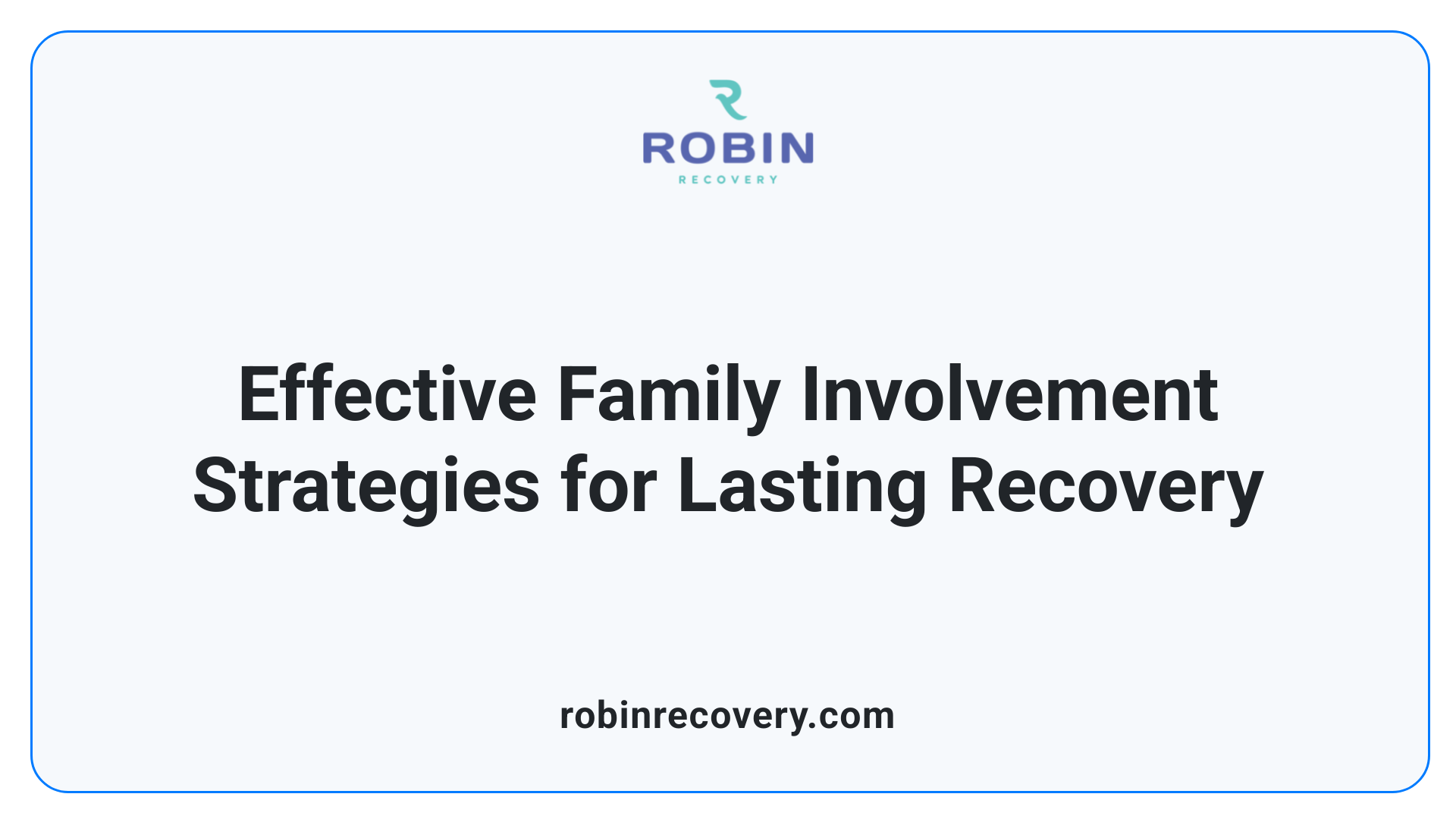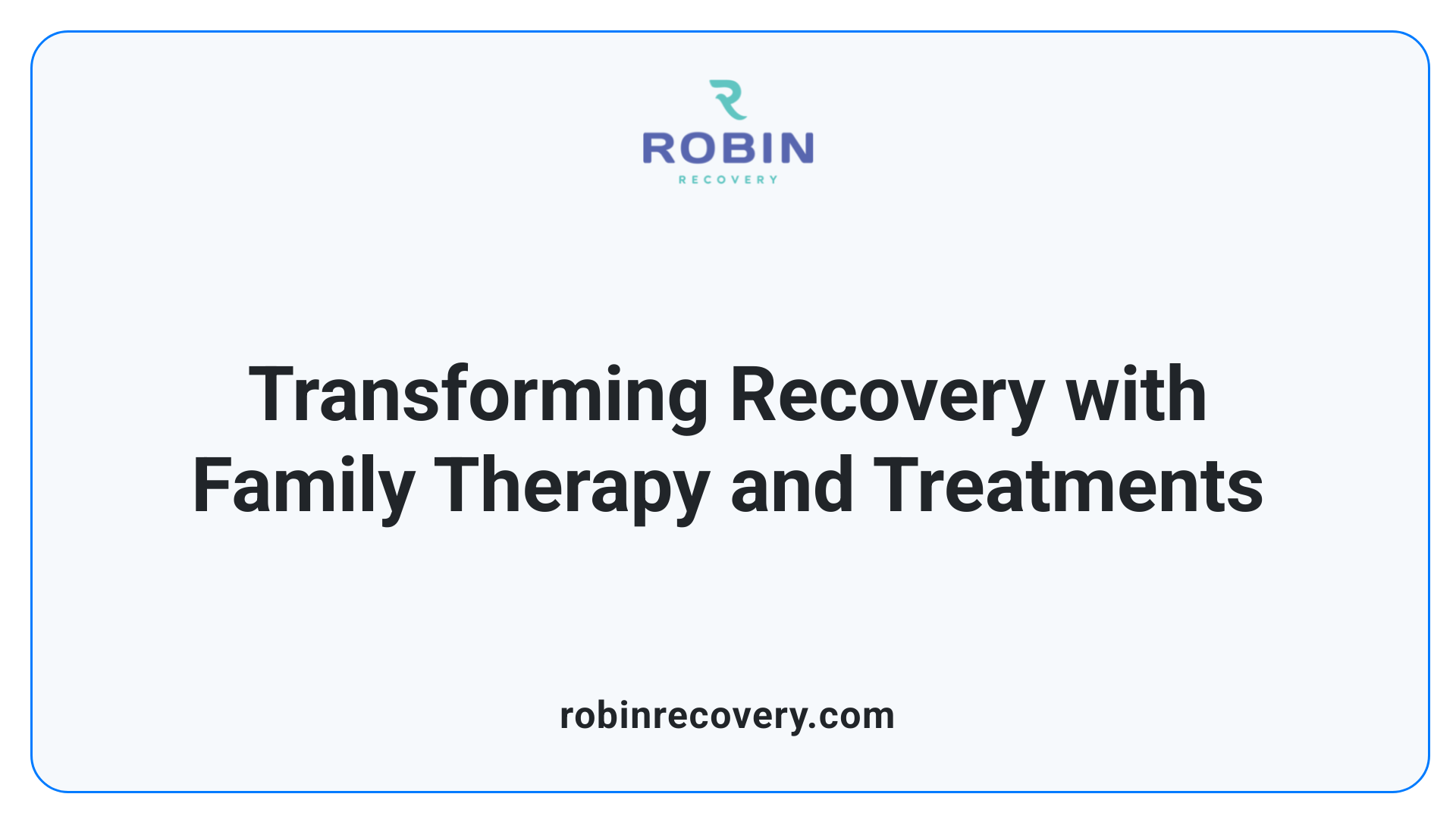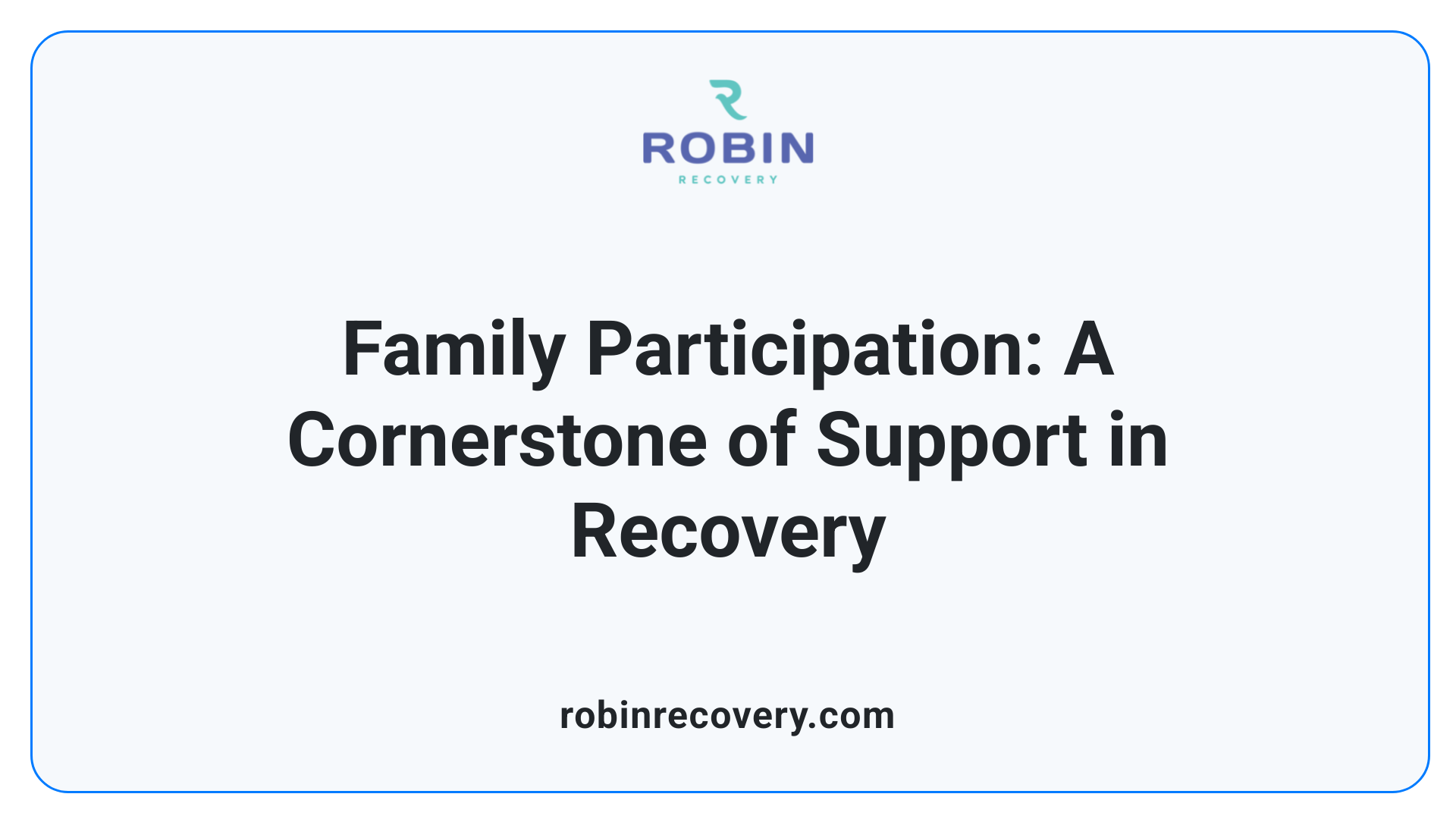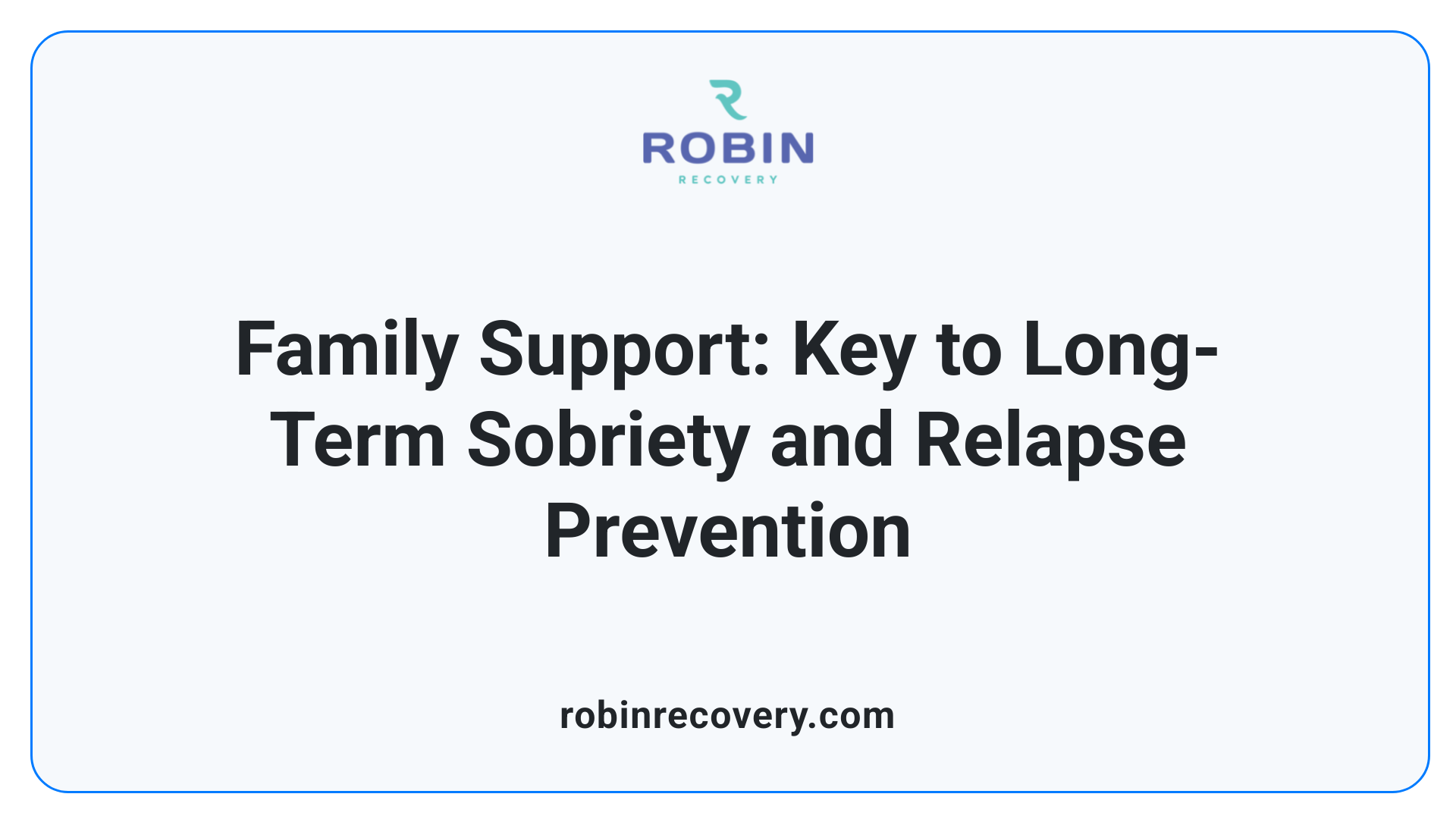The Importance of Family Involvement in Recovery Programs

Understanding the Vital Role of Family in Addiction and Mental Health Recovery
Recovery from addiction and mental health challenges extends beyond individual effort, encompassing the crucial involvement of family members. Their support system, active participation, and understanding fundamentally influence treatment success, long-term sobriety, and overall well-being. This article explores the multifaceted role families play in recovery programs, strategies for effective involvement, and the evidence supporting their impact.
The Impact of Family Dynamics on Addiction and Recovery
What is the impact of family systems affected by addiction?
Addiction does not only affect the individual but also ripples through their entire family system. When a family member struggles with substance use, it often leads to erosion of trust, communication breakdowns, and emotional turmoil within the family. Family members might adopt maladaptive coping strategies such as enabling or emotional withdrawal, which can unintentionally sustain or exacerbate the addiction.
Substance abuse can weaken the fabric of family relationships, causing roles to shift in ways that may not always be healthy. For example, some family members might become caregivers, while others may become scapegoats or the
Strategies for Effective Family Involvement in Recovery

What strategies can effectively involve families in the recovery process?
Involving families in addiction and mental health recovery is essential for fostering a supportive environment that promotes long-term sobriety. One of the most successful approaches involves using evidence-based family therapies such as Multidimensional Family Therapy (MDFT) and Behavioral Couples Therapy (BCT). These therapies focus on improving family communication, strengthening relationships, and addressing dysfunctional dynamics that may contribute to substance use.
Programs like Community Reinforcement and Family Training (CRAFT) are tailored to improve engagement by empowering family members to motivate their loved ones towards treatment. These therapies help families understand addiction as a chronic disease, reduce misconceptions, and build healthier interactions.
Providing comprehensive education about addiction is fundamental. It helps family members grasp the nature of addiction, recognize signs of relapse, and avoid enabling behaviors. Education also reduces stigma associated with substance use disorders, encouraging empathetic support.
Strengthening communication within the family is another crucial strategy. Structured exercises such as active listening, conflict resolution, and expressing empathy foster open dialogue. Addressing underlying family conflicts and establishing healthy boundaries prevent codependency and enabling,
Continuous engagement across all treatment phases—from initial diagnosis through ongoing recovery—is vital. Family involvement during diagnosis allows for better understanding and planning. During active treatment, family members can participate in therapy sessions, and in the maintenance phase, ongoing support groups and check-ins help sustain progress.
Supporting families also involves providing resources like support groups, mental health education, and opportunities for self-care. Peer-led support groups such as Al-Anon or Narc-Anon offer emotional relief, practical advice, and shared experiences. Encouraging self-care helps family members manage stress and maintain their well-being, which is crucial for sustained support.
By integrating these strategies—evidence-based therapy, education, communication enhancement, continuous involvement, and self-care—families can become powerful allies in the recovery journey, increasing the likelihood of lasting success.
Why is family participation beneficial during mental health or addiction recovery?
Family participation significantly benefits recovery outcomes in mental health and addiction cases. It provides emotional backing, which boosts individuals' confidence and motivation during challenging times.
Educating family members about the realities of addiction or mental health conditions improves their understanding and reduces stigmatizing beliefs. This knowledge fosters empathy and patience, key ingredients for a nurturing environment.
Involvement through therapy sessions and support groups helps repair fractured relationships, promoting honest communication and mutual understanding. Furthermore, setting healthy boundaries ensures a balanced dynamic that supports recovery without enabling addictive behaviors.
Family support also encourages accountability—the loved one's participation in treatment is reinforced through the family’s active encouragement and monitoring. This collective effort supports habit-forming, relapse prevention, and better adherence to treatment plans.
Overall, active family participation creates a resilient support network, which is associated with better recovery rates, lower relapse risks, and improved emotional well-being for the individual. It also facilitates the family’s own healing process, strengthening relationships and fostering resilience across generations.
Resources for more information
For further strategies and insights, searching for "Family involvement strategies in addiction recovery" can provide extensive resources including articles, therapy programs, and community initiatives. These resources highlight the importance of integrating families into all aspects of treatment, emphasizing that recovery is a collective journey involving both the individual and their support system.
The Role of Family Therapy and Family-Based Treatments in Supporting Recovery

What role do family therapy and family-based treatments play in recovery?
Family therapy and family-based treatment approaches are vital components of addiction recovery, emphasizing the active involvement of loved ones to facilitate sustained sobriety. These interventions are designed to improve not only the individual's treatment outcomes but also to strengthen the overall family dynamic, which is often affected by substance abuse.
One of the primary goals of family therapy is to improve communication between family members. Effective communication helps reduce misunderstandings, foster empathy, and build trust. Therapists work with families to explore existing conflicts, address underlying issues, and learn healthier ways to interact. This process aids in creating a supportive environment that encourages honesty, openness, and mutual respect.
Rebuilding trust is another central objective. Substance use can erode trust within the family, leading to feelings of betrayal, anger, and guilt. Family therapy aims to repair these damaged relationships through guided discussions and positive interactions. As trust is restored, family members become more engaged in supporting the individual's recovery journey.
Different types of family therapies are used to meet various needs:
Type of Therapy Focus Methodology Typical Use Cases Family Systems Therapy Family as a whole Exploring relational patterns Addressing dysfunctional communication or roles Behavioral Family Therapy Behavior change Reinforcing positive behaviors, setting limits Supporting behavioral modifications in adolescents Multisystemic Therapy (MST) Ecological factors Addressing multiple influences including peers, school, home Youth with complex behavioral issues
Research confirms that family therapy significantly improves treatment retention, adherence, and recovery outcomes. Meta-analyses show that incorporating family-based interventions reduces substance use frequency and relapse rates. Evidence-based models like Family Behavior Therapy (FBT) have demonstrated positive impacts, especially when tailored to individual family dynamics.
Addressing family dynamics helps modify interaction patterns that may contribute to substance use or hinder recovery. Therapy encourages families to adopt healthy roles—such as being supportive, accountable, and encouraging positive actions. These changes help foster resilience and empower families to maintain long-term sobriety.
In conclusion, family therapy and related interventions serve as powerful tools to strengthen the recovery process. By addressing relational issues, promoting open dialogue, and building a supportive environment, these treatments optimize the likelihood of sustained sobriety and improved family well-being.
Supporting Loved Ones Through Family Participation During Recovery

How can families support loved ones through recovery?
Family members play an essential role in their loved one’s journey toward sobriety. They can do this by offering consistent encouragement and emotional support, helping create a nurturing environment where the individual feels safe and valued. Educating themselves about addiction and the recovery process is fundamental, as understanding the chronic nature of addiction helps families communicate effectively and set realistic expectations.
Involving loved ones in treatment planning, family therapy, and support groups not only reinforces the individual's commitment but also strengthens the family bond. Support groups such as Al-Anon, Nar-Anon, and others provide valuable spaces for emotional healing, shared experiences, and learning coping skills.
Moreover, setting healthy boundaries and practicing self-care are vital strategies. Boundaries prevent enabling behaviors and promote accountability, while self-care ensures that family members maintain their mental and emotional well-being. Transparency with professionals and utilizing community resources like the SAMHSA Helpline enhance the support network available to both the individual and their family.
Why is family involvement important in addiction recovery?
Research demonstrates that active family participation considerably improves recovery outcomes. Meta-analyses and studies confirm that individuals with strong family support are more likely to adhere to treatment plans, remain in recovery, and avoid relapse. Family engagement helps fix dysfunctional dynamics, rebuild trust, and foster better communication, which are crucial for long-term sobriety.
Family-based treatments, including behavioral family therapy and multi-systemic therapy, are evidence-backed approaches that significantly reduce substance use and improve behavioral health. These programs focus on educating families about addiction, managing conflicts, and developing skills to support recovery without enabling the cycle of misuse.
Furthermore, involving families extends beyond individual treatment, impacting community health by reducing societal costs related to substance abuse. Effective policies promote including families at all stages—early intervention, active treatment, and ongoing recovery support.
Creating a safe and trusting environment
A stable, trusting environment is foundational in supporting recovery. Families can foster this by maintaining open, honest, and empathetic communication. Demonstrating patience and understanding encourages the recovering individual to share struggles and successes alike.
Consistency and reliability within the household build a sense of security. Limiting triggers and avoiding judgment help the individual focus on their recovery goals. Celebrating small wins and reinforcing positive behaviors can significantly boost their motivation.
Setting clear, healthy boundaries protects both the individual and family members from codependency or enabling behaviors. Respecting personal space and fostering independence also contribute to a positive environment where healing can take place.
Educating family members about addiction and the recovery process
Education is vital in transforming family dynamics. Knowledge about addiction as a chronic disease reduces blame and stigma, fostering compassion. Families learn about the behavioral, psychological, and physical aspects of substance use disorder.
Attending family therapy sessions and support groups enhances understanding and equips members with practical tools for effectively supporting their loved ones. These resources often cover topics like recognizing triggers, avoiding enabling behaviors, and maintaining healthy communication.
Educational programs, such as those offered by Gateway Foundation, also include information on medication-assisted treatment, relapse prevention, and the importance of continuous support. Well-informed families can better navigate setbacks and celebrate progress.
Involving loved ones in treatment planning and support groups
Active involvement in treatment planning allows families to understand what the recovery journey entails. Participating in therapy sessions or family meetings enables families to voice concerns, ask questions, and contribute to their loved one's goals.
Support groups serve as valuable resources where families can find emotional validation and practical advice. Regular participation helps families develop coping strategies, learn from peers' experiences, and combat feelings of isolation.
By integrating family members into treatment and support activities, the recovery process becomes a collaborative effort, increasing motivation and accountability.
Setting healthy boundaries and practicing self-care
Healthy boundaries empower families to provide support without overextending themselves. Clear boundaries define acceptable behaviors and roles, helping prevent enabling or codependency.
Practicing self-care is equally important. Family members should prioritize their mental and emotional health, seek their own support if needed, and avoid burnout. Engaging in activities outside the caregiving role helps maintain resilience.
Balancing support with self-preservation creates a sustainable foundation for ongoing involvement. It also models positive behaviors for the recovering individual, emphasizing the importance of mutual respect and personal well-being.
Strategy Description Benefits Encouragement and Emotional Support Providing praise, understanding, and reassurance Builds confidence and trust Creating a Trusting Environment Open communication and consistency Fosters safety and stability Education about Addiction Learning about disease, treatment options, and coping skills Empowers families to support effectively Family Therapy & Support Groups Active participation in guided sessions and groups Strengthens relationships and reduces isolation Setting Boundaries & Self-care Clear rules and personal health focus Prevents burnout and encourages respectful interactions
Supporting loved ones through active family participation enhances the chances for lasting recovery. It involves educating oneself, creating a safe environment, and engaging in therapeutic and community resources. When families commit to these practices, they help build resilience, restore trust, and foster hope—transforming the recovery journey into a shared path toward wellness.
Family Support's Impact on Long-Term Sobriety and Relapse Prevention

How does family involvement influence long-term sobriety and relapse prevention?
Family involvement is a crucial factor in maintaining long-term sobriety and preventing relapse among individuals recovering from substance use disorder. When families actively participate in the recovery process, they offer more than just emotional comfort; they create a nurturing environment that fosters resilience and boosts morale.
Emotional support from family members can help individuals manage stress and navigate the challenges of recovery. Encouragement and understanding from loved ones bolster self-esteem and confidence, which are vital during vulnerable periods.
Accountability roles taken on by family members—such as monitoring medication, assisting with appointments, and encouraging adherence to treatment plans—contribute to the patient's sense of responsibility and commitment.
A stable and supportive home environment reduces the triggers and stressors that often lead to relapse. Open communication, healthy boundaries, and trust-building activities help address underlying issues that could otherwise drive someone back toward substance use.
Family functioning directly impacts relapse risk. Dysfunctional dynamics, including poor communication, mistrust, or unresolved conflicts, increase vulnerability. Conversely, healthy interaction patterns promote understanding and cooperation, creating a safety net for the recovering individual.
Early warning signs of relapse can often be identified through attentive family observation. Changes in behavior, mood, or routines—such as withdrawal, irritability, or neglect of personal responsibilities—may signal underlying struggles.
Family members trained in recognizing these signs can intervene promptly, encouraging the individual to seek help or return to therapy before a full relapse occurs.
Strategic family-based approaches to relapse prevention include regular involvement in therapy, educational programs, and participation in support groups like Al-Anon or Nar-Anon.
These strategies aim to strengthen communication, foster shared understanding, and create an ongoing support network. Family therapy sessions help address ongoing stresses, resolve conflicts, and rebuild trust, ensuring a cohesive and supportive environment.
Additionally, promoting shared activities, setting common goals, and establishing routines contribute to a sense of stability.
Research highlights that individuals supported by engaged families show higher levels of treatment retention, abstinence, and overall well-being. Family engagement not only provides a safety cushion but also boosts motivation and commitment to sobriety.
In sum, a strong, educated, and involved family forms the backbone of effective relapse prevention, offering emotional sustenance, practical assistance, and a sense of belonging crucial for sustained recovery.
Harnessing the Power of Family for Lasting Recovery
Family involvement stands out as a cornerstone in the journey toward lasting recovery from addiction and mental health issues. Through education, therapy, and active participation, families can help rebuild trust, foster open communication, and create an environment conducive to sobriety. Evidence consistently demonstrates that strong family support increases treatment adherence, reduces relapse rates, and sustains long-term recovery. Embracing a holistic, family-centered approach not only benefits the individual but also promotes healthier relationships and resilient family units. As recovery programs continue to evolve, integrating family participation will remain essential for achieving sustainable mental health and addiction recovery outcomes.
References
- The Role of Family and Friends In Addiction Recovery
- The Role Of Family In Addiction Recovery
- The Importance of Family Support in Addiction Recovery
- The Importance of Family Support In Recovery - Ashley
- Retention Toolkit: Family Involvement - UW ADAI
- The Role of Family Support in Addiction Recovery
- Family Roles in Addiction & the Importance of Family Support in ...
- Family Involvement in Treatment and Recovery for Substance Use ...
